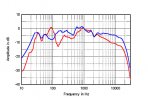Interesting

How do you logically reconcile the realism of the drums perceived through your Devores with the fact that (presumably) the Revels measured flatter?
Do you perhaps attribute this to a non-flat frequency response in that particular recording?
Or is it perhaps more that the Devores emphasised a particular part of the sound that you really liked? (This could be enjoyable but should actually be less real).
Perfect question! Be prepared to wish you didn't ask. Short answer: I don't know. I only have hunches.
I have a general understanding of the sonic implications of some speaker measurements. But I can't perfectly predict precisely how any given speaker will sound from the measurements only. I'm not sure anyone can (even super experienced people like John Atkinson or Amir can find themselves surprised somewhat when a measurable anomaly is either surprisingly more, or less salient in the perceived sound during the listening test).
It's very hard for me to predict exactly why a speaker will just slide over to that point where I perceive it as "more organic, less mechanical, more real and present rather than recorded."
I can only say that I have constantly paid attention to the character of real sound, against reproduced sound. Aside from having played many instruments, I live in an area where live bands playing in street corners and parks are routine - an almost every day encounter in warm weather. I constantly close my eyes and take stock of the character of real sax, real trumpets, real drums, and listen for what is different vs reproduced "why does this sound real, not recorded? what's characteristics are salient in telling me 'this is real?'
Typically I hear a timbral warmth and richness, combined with a clarity and presence, a texture, that is just "there," unmediated.
It's my working hypothesis that the artificiality I hear from some neutral speakers isn't the speakers, but the recording. In most recordings, there is a collection of colorations built in, from mic choices, to mixing choices, processing etc, and then ultimately through the limitations of recording/playback...it just sounds artificial. It typically sounds reductive, harder, squeezed, harmonically less warm, no longer made of "organic stuff" but mechanical.
But...for whatever reason...I find SOME sound systems, and some speakers, make recordings sound less artificial. So for instance with the Devores, when bongos were in the mix, there was an immediate "pop out of the recording" texture to the hands hitting the skins, a very recognizable character of "live." It didn't sound glazed over and canned as through most of the other speakers. Likewise drum skin after drum skin - snares, toms etc - had that recognizable organic 'happening right there' character. Also, the Devores produced a more recognizably "live" sensation with kick drums. In many super neutral audiphile systems, drums can be dynamic, super tight. But there is often a sense of the kick drum (and bass) being "back there, holographically placed somewhere behind the speakers" in a sort of detached way. The Devores produced that "whack" of the peddle hitting the bass drum, but also had a sort of bloomy, rolling out across the floor bass warmth that I could feel with each kick drum...very recognizable from my many years sitting in front of drum sets being played in our basement.
Now, PRESUMING we are talking about audible colorations, at least conceivably, all this could be the result of some canny colorations - for instance some lower midrange or upper bass extra warmth engineered in, it could be coming from an emphasis due to some ringing in the cabinet adding "body and warmth and solidity" to the sound. Some emphasis at just the right spot in the bass. Maybe something to do with the wavelaunch using the wide baffle. Maybe there is just the right "built in EQ" in the upper mids, or maybe even a touch of roughness there, that produces that textural presence that strikes me as "right there" and less "recorded." I dunno. I can only say that the Devores FOR ME reliably produced this sensation of "more live" than some other "better measuring" speakers (including the Kii 3 I auditioned). (Devore is a drummer, and says he designs speakers to sound "right" to him, which would include reproducing the gestalt of drums. The typical ASR member would find this approach to designing speakers absurd, but to those who listen for what John listens for, care about what John cares about, the sound of Devore speakers can be just the ticket, just what they were looking for).
And I also face a problem in terms of any explanation: I've noticed that the more engineer-minded someone is, the more inclined to be highly technical in reading measurements...the LESS likely that person is to be evaluating sound in the way that I do! For instance, many here will roll their eyes at all the above as poetic fluff that they just aren't interested in. So the people who might have the knowledge to find the explanation are least inclined to do so.
So, basically, I have my own impressions of live sound, and since I'm buying a sound system for my own pleasure and goals, I go on my own impressions when listening to speakers. I also enjoy listening to neutral great measuring speakers as well! I like the variety. But for my own purchases, they have to tick off certain "it sounds right" boxes or I will not be compelled to listen.


